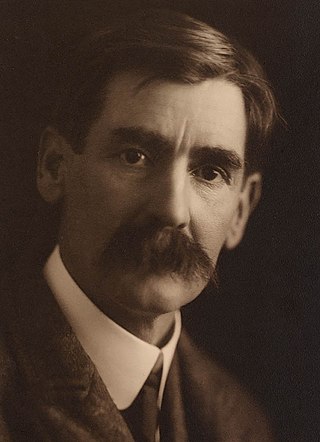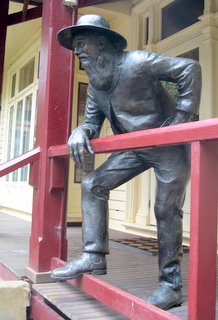
Henry Archibald Hertzberg Lawson was an Australian writer and bush poet. Along with his contemporary Banjo Paterson, Lawson is among the best-known Australian poets and fiction writers of the colonial period and is often called Australia's "greatest short story writer".

"The Man From Ironbark" is a poem by Australian bush poet Banjo Paterson. It is written in the iambic heptameter.
"Freedom on the Wallaby", Henry Lawson's well known poem, was written as a comment on the 1891 Australian shearers' strike and published by William Lane in The Worker in Brisbane, 16 May 1891.
Scots of the Riverina is a 1917 Australian bush poem by Henry Lawson. It relates the story of a boy who left his home in Riverina and is shunned by his family until he dies in World War I.
"Saint Peter" is a well-known poem by iconic Australian writer and poet Henry Lawson. It was first published on 8 April 1893 in The Bulletin.
Up The Country is a popular poem by iconic Australian writer and poet Henry Lawson. It was first published in The Bulletin magazine on 9 July 1892, under the title Borderland, and started the Bulletin Debate, a series of poems by both Lawson and Andrew Barton "Banjo" Paterson about the true nature of life in the Australian bush.
The City Bushman is a poem by iconic Australian writer and poet Henry Lawson. It was first published in The Bulletin magazine on 6 August 1892, under the title In Answer to "Banjo", and Otherwise. It was the fourth work in the Bulletin Debate, a series of poems by both Lawson and Andrew Barton "Banjo" Paterson, and others, about the true nature of life in the Australian bush.
The Poets of the Tomb is a poem by Australian writer and poet Henry Lawson. It was first published in The Bulletin magazine on 8 October 1892 in reply to fellow poet Andrew Barton "Banjo" Paterson's poem, In Answer to Various Bards.
"The Drover's Wife" is a dramatic short story by the Australian writer Henry Lawson. It recounts the story of a woman left alone with her four children in an isolated hut in the outback in the late 19th century.
Saltbush Bill is a humorous poem by Australian writer and poet Andrew Barton "Banjo" Paterson. It was first published in The Bulletin magazine on 15 December 1894, the Christmas issue of that publication.
Andy's Gone With Cattle is a poem by Australian writer and poet Henry Lawson. It was first published in The Australian Town & Country Journal on 13 October 1888.

The Teams is a poem by Australian writer and poet Henry Lawson. It was first published in the Australian Town and Country Journal on 21 December 1889. It was later published in the poet's poetry collection In the Days When the World Was Wide and Other Verses in 1896.
"The Never-Never Country" (1901) is a poem by Australian poet Henry Lawson. It is also known by the title "The Never-Never Land".
"Faces in the Street" (1888) is a poem by Australian poet Henry Lawson.
"The Song of Old Joe Swallow" (1890) is a poem by Australian poet Henry Lawson.
"The Fire at Ross's Farm" (1890) is a poem by Australian poet Henry Lawson.
"A Bushman's Song" (1892) is a poem by Australian poet A. B. Paterson.
"The Roaring Days" (1889) is a poem by Australian poet Henry Lawson.
"A Song of the Republic" (1887) is a poem by Australian poet Henry Lawson. It was the author's first publihsed poem.
"His Father's Mate" is a melodramatic short story by Henry Lawson. It was first published in the 22 December 1888 issue of The Bulletin, and later included in the author's short story collection, While the Billy Boils, and in many short story anthologies. It was the author's first published short story.


